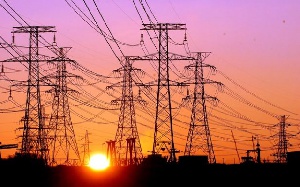The Ministry of Energy has entered into a rental agreement with Trojan Power Limited (TPL), a local independent power producer, to use parts of government’s diesel generator units to generate power for off-take by the Electricity Company of Ghana (ECG) for further distribution to customers.
This was contained in the Finance Committee report on the request for waiver of import duties, import VAT, import NHIL and other approved imports amounting to GH?52m on distillate operational fuel, power equipment and power plant parts for Trojan Power Limited’s Power Plant Operations under an equipment rental agreement with the government of Ghana (Ministry of Energy).
The Agreement is for the lease, repair and use of 40MW diesel generator units owned by the government of Ghana for the generation of power in Tema and Kumasi. These add to an existing 25MW plant in Tema and Kumasi, thus bringing the total plant capacity of TPL to 65MW.
Parliament, before it went on recess, approved implementation of the agreement – aimed at contributing to meet the demand for electricity in Ghana and allow the country to further reduce its dependency on hydropower.
Furthermore, the agreement will contribute to increasing Ghana’s energy independence while meeting load growth as the economy expands.
TPL is taking direct responsibility for fuel, but without taxes on the fuel – thereby ensuring that government does not have to purchase fuel or make cash available for the purchase of fuel.
The tax-exclusive regime provided under the agreement allows the importation of fuel, equipment, machinery and materials used in connection with the project free from Customs duties and VAT, as well as other aspects of the project’s operations.
TPL also indicated that without the contemplated tax waivers, it will have to pay an additional 35% in duties, levies and taxes on fuel alone procured annually for its power plants to generate power.
The Public Utilities Regulatory Commission (PURC) has also indicated that the only tax included in the tariff approved for TPL is corporate tax. The PURC also stated that the imposition of similar fuel taxes on power generators in the country “will result in an overall impact of a further 36.7% on electricity consumers’ end tariffs”.
Pursuant to clause 2 of the agreement, TPL is required to among other things pay a rental charge in United States dollars per unit per month, and to operate and maintain the equipment in strict compliance with the operating and maintenance manual as may be supplied by the Ministry of Energy.
Background
During the energy-generation challenges of 2007, government procured 127 diesel generating units – currently situated at Tema and Kumasi – to help bridge the generation shortfall. The units were handed over to the VRA in 2009 for preservation after the operation.
VRA has given some of the units to state institutions, while a greater number are inoperable due to inadequate maintenance.
Under the private sector participation in power generation and based on a request from Trojan Power Limited (TPL), a company duly incorporated in Ghana, the Ministry of Energy leased out parts of the units to TPL for its operations under a Rental Agreement. TPL is using the units to generate power for off-take by ECG for further distribution to customers.
TPL is required under the Agreement to procure and maintain – at its own cost for the Term of the Agreement – an insurance policy to cover any loss or damage to the equipment, and any risk of harm to the general public by the equipment.
In accordance with the Equipment Rental Agreement (ERA), the PURC tariff approval and other agreements covering the project, the company is not expected to pass the project’s tax costs to the ECG or final consumer.
The company receives a tariff that is exclusive of taxes, thus allowing it to carry out the project without payment of taxes.
Click to view details



Business News of Friday, 6 April 2018
Source: thebftonline.com

















